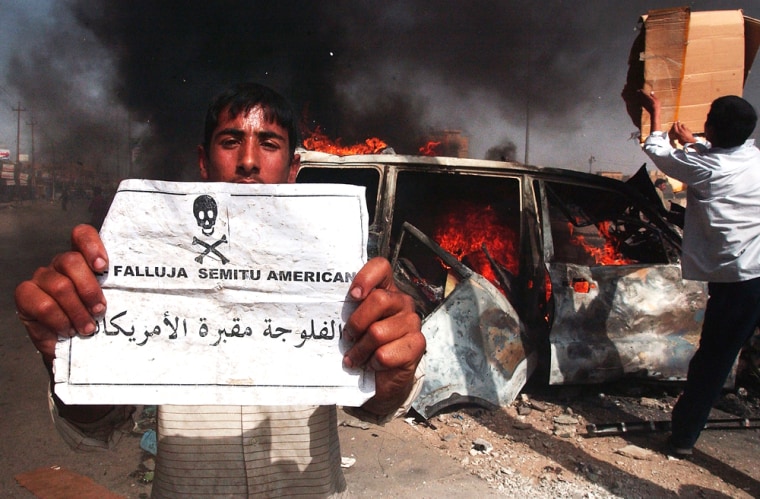Call it the Mogadishu effect: nightmarish, beastly images of humiliating death so far beyond the pale of the Western idea of war that they shake American politics to the core. Will the pictures from Fallujah have the same impact that the ones from Somalia had a decade ago? Bill Clinton flinched back then. Will George Bush?
Here's why I ask: I've never thought that the Clarke-Condi battle would decide the presidential election. It's Iraq that will matter. The fundamental question: whether the invasion and occupation of that country has made America safer — or less so.
A cursory reading of this week's Newsweek poll might lead you to believe that Clarke's attack had eroded President Bush's standing as a "wartime president." Indeed, Bush's approval ratings for handling "terrorism and homeland security" are dropping — from a recent high of 70 percent in January to 65 in February to 55 percent last week. But most of that was before Clarke's 15 minutes of fame, and the overall decline has little to do with the former anti-terrorism official's prime-time assault.
Rather, the cause of the president's decline is the drumbeat of bad news out of Iraq, which continues to provide images that defy the White House story line. To be sure, there is good news from that ancient land: re-opened schools, electricity working, a remarkable (for the Islamic world) provisional constitution with guarantees of free speech, religion and assembly. Were Iraq to become a stable, democratic state, it would be hard to argue that America was not safer as a result. A big country with vast oil reserves to bankroll terrorists in the middle of an antagonistic region would be off the enemies list.
But in politics as in life a picture is worth a thousand words, and videotape is worth millions. And the more gruesome the images, the more politically explosive they can be. In December 1992, former President George Bush dispatched American forces to Somalia in an effort to neutralize the Islamic warlords there. On Oct. 3, 1993, dead American soldiers were dragged through the streets of Mogadishu — an image that played in a never-ending loop on American TV.
Four days later, an order to leave
President Clinton ordered the troops to leave four days later.
Enemies of the American occupation of Iraq are all too aware of the impact of grisly imagery and tactics. Their theory is that American resolve will crumble once the voters (and leaders) are exposed to the unimaginable hell of war without rules. Modern technology being what it is, it took only a few hours for photos of charred and mutilated bodies — and the celebratory crowds around them — to make it onto the news Web sites of the Western world.
The Web gives an intimacy and immediacy that, in its own way, is more powerful than television. The terrorists are sending public/private messages: You cannot fight the way we do. You will have no peace here. The notion that you will remake this part of the world is folly. Get out now, before this happens to others here, and ultimately, to you, there.
President Bush is, of course, far more committed to Iraq than Bill Clinton (or George H.W. Bush before him) was to Somalia. But the question now is how the current president will respond to what are sure to be continued incidents like the one in Fallujah. A "handover" to a provisional government is supposed to take place in June. Jerry Bremer is supposed to be replaced. Iraq is supposed to be a better, more stable place when we begin slowly but surely pulling up the stakes.
Some neocons may squawk that we are "abandoning" Iraq, but few others will complain. Most will ask: Was it worth it in the first place? The president argues an emphatic "yes," Sen. John Kerry (though he voted to give the president authority to go to war) will argue an equally emphatic "no." He will note that we have spent perhaps $200 billion and lost hundreds of lives, with thousands more maimed. We are not safer as a result, Kerry will say over and over.
Americans are of two minds
The American people seem to be of two minds. On the one hand, they continue to say (though by dwindling margins) that we did "the right thing" by going to Iraq. The current divide is 55-42, compared with a high of 68-28 percent last summer. But at the same time, by the largest margin yet, they think that going to Iraq made us less safe, not more. The current ratio is 43-24 percent, with 26 percent saying the war in Iraq made no difference. My interpretation: Voters are still hoping that the president's decision was the right — and the wise — one in the long run, but they are having more doubts.
I know from talking to dozens of swing voters in Ohio and Florida that those who aren't committed Democrats — who still have an open mind — are willing to give the president the benefit of the doubt on his theory that going to Iraq was the right thing to do. But more pictures like the ones from Fallujah could change their minds, and it's still seven months to Election Day.
